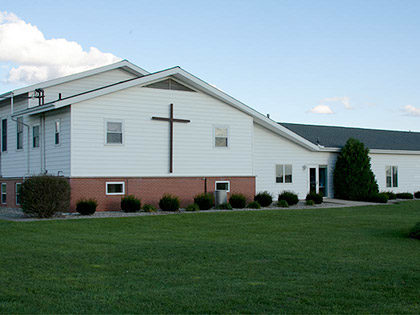The Work of Ministry is Done by Many
Announcements:
- VBS went well!
- Special Projects Offering
Introduction:
We come at last to the end of the letter written by Paul to the Colossians. Paul is the human author of this letter – but the words are God-breathed and Paul writes without error under the inspiration of God the Holy Spirit. Because Paul is the human author of the letter, we’ve heard a lot about Paul the last few months – Paul says this, Paul says that. Paul is in prison. And so on.
A lot of times, when people imagine the ministry of Paul, they tend to think of him as a brave, lone wolf out there. You see Paul going into synagogues and marketplaces and forums and courts to preach the Gospel, traveling here and there by boat, walking, suffering persecutions and toil. You read through Acts and you see Peter and Paul a lot, so you might get the impression that they did all the work.
Sometimes we look at missionaries today like that still – brave, lone wolfs out there doing the work of God all by their lonesome.
These last verses are often overlooked by us as we read the Bible because they are filled with names we don’t recognize and have many short statements. But these verses have a lesson to give us and that is to show that the reality of the situation was very different from a lone wolf doing all the work.
In fact, as these verses make clear, Paul doesn’t do all the ministry by himself. There are many other people serving, both men and women. Because Paul is the mouthpiece and leader of the ministry going on, he tends to get the majority of the recognition. But nobody can do all the ministry by themselves. Not then, not now. Not even Paul. That brave, lone wolf that we imagine to exist in fact does not.
This past week at VBS I think we had around 20 people helping to make it possible. We had people chaperoning kids, teaching, leading, signing kids in, helping with crafts, helping with decoration, games, snacks, clean-up, and security. We had around 40 to 50 kids on any given day. Can you imagine what it would have been like if we had had 1 helper instead of 20? Instead of being a great week of ministry, it would have been an embarrassing disaster, especially when our teacher had to leave for an emergency on one day.
Just the same, Paul didn’t plant churches all throughout the middle-east and Greece by himself. Today we get to read about a number of people also involved in the work of ministry.
Text: Colossians 4:7-18
Theme: The Work of Ministry is Done by Many
Verses 7-9
First, someone had to deliver this letter to Colossae. Paul was in prison and could not do it himself. Evidently, the ones to deliver the letter were Tychicus and Onesimus. They also reported on all the missionary activities that were taking place.
Tychicus is called a beloved brother, faithful minister, and fellow servant. He is also an encourager. This was not the only mission that he went on. Acts 20:4 mentions him as helping to collect and deliver a large offering to the church in Jerusalem. Paul also sent him to Ephesus (2 Timothy 4:12) and to the island of Crete (Titus 3:12) for ministry purposes. He was evidently pretty good at delivering messages and encouraging churches.
Onesimus is called a faithful and beloved brother. You may or may not recognize that name, but there is actually a small book in the Bible written about Onesimus. Really! The book is called Philemon, because it is written to Philemon, but it is in equal parts about Onesimus and Philemon. Onesimus was a slave who had run away from Philemon, a personal friend of Paul’s. Somehow or another, Onesimus ended up with Paul. Paul wrote a letter to Philemon encouraging Philemon to forgive Onesimus and even hinted strongly that the proper Christian thing for Philemon to do would be to release Onesimus from slavery.
There is a fairly good chance that Tychicus and Onesimus carried both Colossians and Philemon. I believe Tychicus accompanied Onesimus back to Philemon after delivering this letter, and helped encourage Philemon to do the right thing. The Bible doesn’t say that, I just strongly suspect it. If you compare both Colossians and Philemon, you will see that both of the letters include greetings from Epaphras, Aristarchus, Demus, Mark, and Luke.
Philemon is a very small book, a little hard to find, but it will take you less than five minutes to read through if you are curious.
Verses 10-14
Aristarchus was from the church in Thessalonica, which the letters 1 and 2 Thessalonians are written to. He also helped Tychicus take the offering to Jerusalem. He is with Paul in prison, indicating that Aristarchus was doing the same things that Paul did to get him into prison – namely, preaching the Gospel. He must have been pretty passionate about it and good at it to find himself in prison.
Paul doesn’t mention it in this letter, but Philemon says that Epaphras was also in prison with him. Epaphras, in addition to being a Gospel preacher, was also a prayer warrior. I’m sure Paul knew all about Epaphras’ prayers because they were in prison together. Epaphras is also described as a hard worker.
Mark and Luke you surely know, these are the same two who wrote the Gospels named after them. Luke is called “the beloved Physician.” Paul certainly had a lot of medical needs. Being beaten and imprisoned many times, I’m sure Paul really meant it when he said that Luke was the beloved physician! Surely Luke helped to treat the wounds and health of Paul, applying oils and salves and bandages to his hurt back, likely prescribing things to eat and drink. I wouldn’t be surprised if he also helped to take care of Aristarchus and Epaphras. Once, when Timothy’s stomach was bothering him, Paul wrote to Timothy to tell him to drink some wine for his stomach’s sake. Probably something he learned from Luke.
Some have suggested that part of the reason that Luke wrote the book of Acts was in defense of his good friend and patient Paul, who was in prison for preaching the Gospel.
Demas we know very little about except for something rather sad. Demas is mentioned a few times in Paul’s letters giving greetings. He was evidently a personal friend of Paul’s who spent enough time with him to be mentioned in three letters.
But, at the end of Paul’s life, as Paul was writing the last chapter in the last letter he ever wrote – 2 Timothy 4, where Paul writes that he expects to die very soon, he says of Demas “Demas, in love with this present world, has deserted me and gone to Thessalonica.” Oh how that must have hurt Paul. Evidently the situation was that Demas realized Paul was going to be killed and fled to Thessalonica to avoid also being killed; hence he was “in love with this present world.” He didn’t want to leave it, as Paul expected to very soon.
Verses 15-18
Depending on the translation that you have, Nympha could be called a he or a she. This is one of those very, very rare times in the Bible where it is difficult to know which is correct. Quite a lot of Greek manuscripts have Nympha as a she and quite a lot of Greek manuscripts have Nympha as a he.
I researched it a good bit and found it only became more confusing, because Nympha means what it sounds like – a nymph. Those mythological beautiful forest dwellers, which were all female. I can’t think of a more feminine name that could be given to anybody, let alone a male. It would be like naming your boy Ms. America.
But on the other hand, all of the earliest church writers referred to Nympha as a “he.” And it’s difficult to imagine that they wouldn’t know what they were talking about. Plus, did you know that John Wayne’s real name was Marion? Pretty feminine name for that famous tough guy of so many westerns! Sometimes people can be given unfortunate names.
And so, some translations will have “her” and some will have “his.” Personally I lean toward Nympha being a female just because I can’t get over how feminine that name is.
Thankfully, it isn’t very important in this case. Nothing about our doctrine or belief is changed by whether this person is male or female. We don’t need this verse to tell us that women serve too. Romans 16 lists quite a number of women serving. The letter of Romans was actually delivered by a woman named Phoebe. A woman named Mary is said to have “worked hard.” Another called Priscilla “risked her neck” for Paul’s life and a church meets in her and Aquila’s home. And several women are called Paul’s fellow workers, and one a fellow prisoner.
The letter from Laodicea is probably Ephesians. Ephesus, Laodicea, and Colossae were all in similar areas and the letters Ephesians and Colossians are a lot alike. Churches would share letters with each other to help with their teaching and make copies of them. That’s why we have the New Testament today!
Colossians 4:18 indicates that verse was written by Paul’s own hand. Very probably Paul dictated his letter to someone else who physically wrote the letter. Paul is in a prison cell, someone is visiting him with pen and ink, and he is telling them what to write. It could be Timothy, Tychicus, Onesimus or someone else. At the last, Paul writes the last bit in his own hand – kind of like singing the document to show that it is authentic.
Application:
It takes all sorts to do the work of ministry. It takes men and women. This morning we have seen that it takes writers, messengers, hard workers, givers, speakers, teachers, doctors, prayer warriors, comforters, hospitable persons, and encouragers. The work of ministry cannot be done by one alone. Some may get more recognition from their fellow man than others, but let us not forget that God knows all, knows their work, and His approval is the most valuable thing you can find.
There will be millions of people unrecognized now who will be honored by the Lord for their faithful service. Let us then not be like Demas, abandoning our fellow Christians when they need us most.

